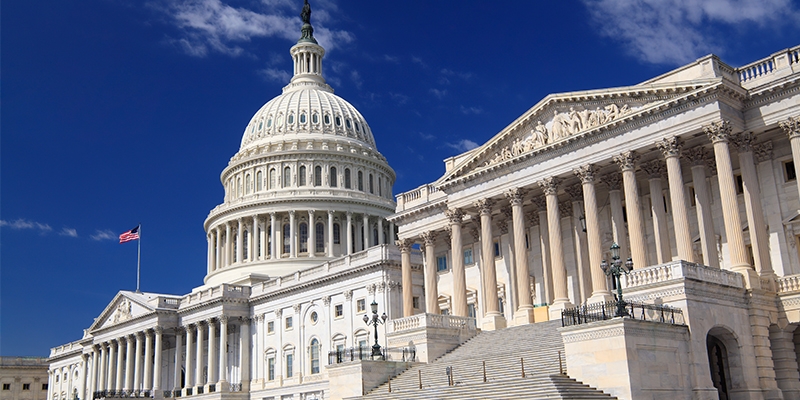Last week, President Joe Biden submitted his proposed fiscal year 2022 budget to Congress, providing lawmakers with additional details regarding the major infrastructure and social spending initiatives comprising his American Jobs Plan and American Families Plan. In times of divided government in Washington, a White House budget is oftentimes described as “dead on arrival” as far as Congress is concerned. But with the Senate and House of Representatives controlled by his fellow Democrats, Biden’s recommendations are sure to be given substantial deference by lawmakers. Nevertheless, differences of opinion do exist among members of the president’s own party regarding many of his proposals. As such, last week’s submission simply marks the beginning of challenging negotiations that are likely to take place over the next two months.
Included in the administration’s budget submission is the Treasury Department’s “General Explanations of the Administration’s Fiscal Year 2022 Revenue Proposals.” Also known as the Treasury “Green Book,” the explanatory text of the administration’s tax proposals provides answers to many questions that NAIOP members, as well as others who make their living in the commercial real estate industry, have been asking since Biden unveiled his infrastructure plans earlier this year. Some of these proposals are concerning because they would have an inordinate negative effect upon real estate investment and transactions. Among the issues of particular focus are the following:
- Effective Date of a Capital Gains Tax Increase: Biden had proposed increasing the capital gains tax rate on those taxpayers with annual adjusted income in excess of $1 million from the current 20% to the top ordinary income rate, with no clarity as to the effective date of the increase. A separate proposal would have raised the top ordinary income rate of 39.6% from the current 37%. The Green Book explanation provides that the proposed top rate for capital gains will be 37%, with the additional 3.8% Net Investment Income Tax (NIIT) imposed by the Affordable Care Act on most capital gains. As a result, the top capital gains rate would be 40.8%. The Green Book also specifies that the proposed effective date would be retroactive to April 28, 2021, which was the date the president unveiled his American Families Plan proposal to Congress.
- Elimination of Section 1031 Like-Kind Exchanges Over $500,000: Biden has proposed eliminating deferral of the gain from like-kind exchanges of real property to an aggregate amount of $500,000 per taxpayer. Any gains from like-kind exchanges in excess of $500,000 (or $1 million in the case of married individuals filing a joint return) during a taxable year would be recognized by the taxpayer in the year the taxpayer transfers the real property subject to the exchange. The provision would be effective for exchanges completed in taxable years beginning after December 31, 2021.
- Carried Interests Taxed as Ordinary Income: Biden had proposed taxing certain partnership profits interests exceeding the proportion of the invested capital in the partnership, commonly referred to as “carried interests” (also known as “promotes,” or “promoted interests”) at ordinary income rates, instead of as currently taxed at lower capital gains rates. The Green Book explanation provides that carried interests for taxpayers with gross income in excess of $400,000 will be taxed at ordinary income rates for taxable years beginning after December 31, 2021.
- Changes to Estate Tax “Step-Up Basis” Rules: Biden has proposed changing how assets in an estate are valued for purposes of applying capital gains taxation. Currently, an asset’s basis for calculating what tax is owed upon sale is “stepped-up” at death, from the original basis to the current fair market value of the property. The Biden proposal would not provide for stepped-up basis, meaning long-held assets that have appreciated in value would face much higher taxation. In addition, the Green Book makes clear that the death of the person would be the “realization” event for when the tax would be imposed, with the decedent paying capital gains on the difference between the fair market value of on the decedent’s date of death over the decedent’s basis in that asset. That gain would be taxable income to the decedent. Note that the asset would still be taxable for estate tax purposes, in addition to the capital gain tax, potentially resulting in double taxation of the unrealized gain on the property.
Certainly, many if not all of these proposals will change as the House and Senate try to develop legislation that will pass both chambers. For their part, Republicans have voiced concerns over the size of the president’s initiative, the scope of what constitutes “infrastructure”, and the tax increases used to fund the policy proposals. Perhaps more importantly, however, numerous Senate Democrats have raised specific policy concerns with the president’s proposals. The White House and the Democratic congressional leadership may believe they can use the budget reconciliation process, which enables legislation to be passed with a simple majority vote instead of the 60-vote number needed to avoid a filibuster. But they need unanimous Democratic support to so, and several primarily centrist Senate Democrats have already signaled they are not in agreement with some of the proposed tax increase.
The unfairness of the retroactive application of tax increases has been raised by commentators, and will be a point of contention in the negotiations. Elimination of Section 1031 would be severely disruptive to commercial real estate markets at a time when many are trying to recover from economic damage suffered as a result of the COVID pandemic. And the real estate industry has offered its perspectives on many of these proposals in a consistent, unified voice, most recently providing a statement from a broad coalition of real estate associations, including NAIOP, to the Senate Finance Committee and the House Ways & Means Committee conducting hearings regarding Biden’s infrastructure proposals.
NAIOP will keep members informed and updated as the negotiations over the president’s tax proposals progress in Congress. A federal Legislative and Political Update Webinar scheduled for June 22 will provide an assessment of the Biden administration’s various proposals on tax policy, as well as the status of policy on infrastructure, energy efficiency, and other major policy initiatives affecting commercial real estate.








